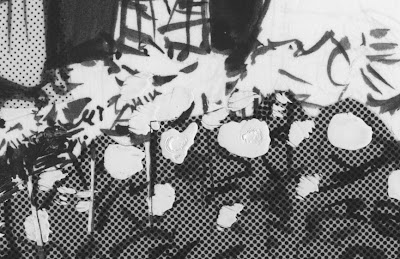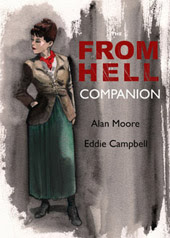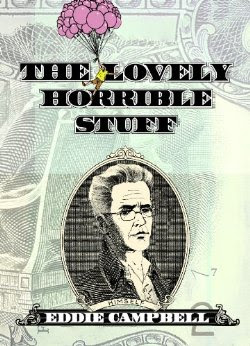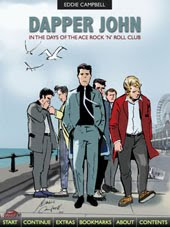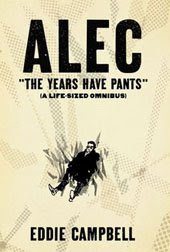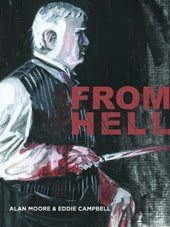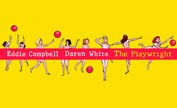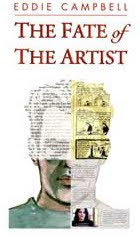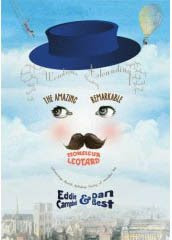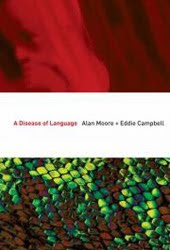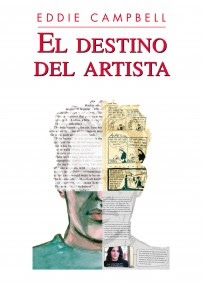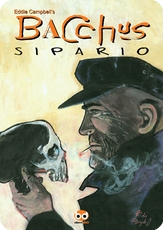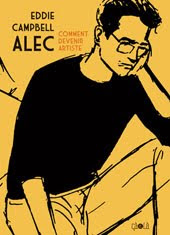E verybody wants a graphic novel. Nobody's sure what one is. And Campbell is to be called to explain it to the world, possibly on TV next week. Just waiting for it to be organized. I scan the news to check the current state of play, in case it's all changed in the last week...
Britain Embraces the Graphic Novel By TARA MULHOLLAND- September 5- NY TIMES
For Paul Gravett, the author of “Great British Comics” and one of the country’s foremost promoters of graphic novels, one of the primary reasons is simply the creation of the “graphic novel” category. “The word comics is laden with so many negative connotations, while the words ‘graphic novel’ give it a certain cachet,” he said.
Connect this to what I was saying
on 27 Aug. regarding there being three schools of thought as to what a 'graphic novel' actually is, and also to this from
The Guardian- nov 20- 2005- Strip lit is joining the literary elite:
"There are a lot of pure geniuses working in the form. But I don't believe it's going to become a truly mass phenomenon. A lot of people who would buy literary fiction find them impossible to read. And it's still difficult to get these books into the bookshops—they're still full of superheroes."—Dan Franklin. (editor at U.K. publisher Jonathan Cape, publisher of Dan Clowes commenting on the U.K. graphic novel market and on cartoonists Posy Simmons and Raymond Briggs being named fellows of the Royal Society of Literature.)
Obviously 'negative connotations' in the first quote is to be identified with 'superheroes' in the second. Strategically, the kind of books I like to make and read could make more headway in the bookworld if they were allowed to travel without being attached to the other kind by leg-irons. I'm reminded of Woody Allen's escaping chain gang in 'Take the Money and Run': "Why are you all standing together like that?" "We're a close family".
Frank Miller on a beach in Cannes last May tells a couple of European interviewers that a graphic novel is a big comic book (identified by me as the second school of thought on the matter and the one that I am sure will win out), which is fine for him as he's a big comic book artist. I don't think he considers the extent to which 'comic book' is probably viewed as a fairly constricted American 'genre' of popular fiction in Europe, nor if he did consider it would he be bothered much, since he operates entirely in the iconic field of the comic book.
My aug 27 piece was linked in a couple of places describing it as 'Eddie Campbell's definition', though how an essay that presents three separate and mutually exclusive views on the matter can be described as DEFinite I do not know. Sounds somewhat INdefinite to me. Stephen Weiner,
reviewing Gilbert Hernandez' Human Diastrophism (Boston Globe, Aug 28), tries to be definite:
In the 1980s, the comics industry was stretching. The concept of the "graphic novel" was born a few years earlier, a story hoping to achieve the same literary import as a prose novel and completed between the front and back cover of a book. Cartoonists were experimenting with both the types of stories told in comics format and the ways these stories were presented.
That sits in the first school of thought, recognizing as it does that the idea of the graphic novel started with an ambition toward literary weight, and it carefully sidesteps the problem area mentioned above. Weiner proceeds from there to a proper review of the work in hand, without even referring to the book's drawings until the fifth and final paragraph, and without using the term 'comic book', though the thought that such efforts come out of a comics 'industry' discomforts me a little (would we say the 'literature industry'?).
Observe: (NY SUN- Sept 5)
Ronald Reagan, a Graphic Biography, to be published next week by Hill and Wang, and note that the descriptive term puts the publisher in my third category, in which the word 'graphic' gets divorced and remarried. The first school of thought doesn't do this because it always accepted that the term 'novel' is a misnomer and the second doesn't do it because it's so wrapped up in comic books it's not really aware of the existence of other modes. I'm not sure why the third school doesn't realize the word 'graphic' is pretty much a misnomer too ('written, drawn, or engraved'), or at least is so vague in this context as to ask more questions than it answers. The reviewer, whom I will not give a name, obviously thinks its an 'industry', because throughout 21 paragraphs he neglects to mention the name of an author (and otherwise sits in my second category, having no sense of a comic strip earlier than Superman, and note that he credits DC comics with authoring that one):
To portray the story of Reagan's road to and life in the White House as a comic strip may seem a trivial means of imparting a grand political message, but the effort turns out to be both ingenious and fair minded, showing with admirable impartiality how a poor boy from Tampico, Ill., became president...
Comic strips have come a long way since DC Comics gave birth to Superman and the other pulp fiction superheroes. From the moment Roy Lichtenstein elevated the form to the highest art, comic books in the guise of "graphic novels" have attempted to be taken seriously both as art and as literature, with mixed results.
The Reagan graphic biography lifts the ambition of the form to a new plane, and if the likeness of Reagan is sometimes woefully approximate and the drawing of other familiar characters, such as John Kennedy, Jimmy Carter, and Mikhail Gorbachev, suggest only a vague acquaintance with reality, it is hard to fault the seriousness of the enterprise.
To ensure accuracy, the book is at times too wordy and strains to encapsulate the long career of the oldest politician ever to enter the White House in a limited number of frames, but never mind.
Ears that have long been bashed by Campbell will recall that I suggested (In my Comics Journal interview last year) that the idea of the 'graphic novel' (whatever it ended up being, for the idea and the term preceded the object) was a consequent of a shift in our way of thinking about 'comics', and that one of the hallmarks of this new era is a respect for the authorial voice. Good or bad, a strip cartoon is today never considered anonymous or the product of an 'industry'. And I expect that's the only part we all agree on.
**********
Plagiarism is a subject we like to revisit occasionally here at Campbell blogspot:
Corrupt official plagiarizes trial apology-Wed Sep 5,-. BEIJING (Reuters) -
Zhang Shaocang, former Communist Party chief of state-owned power company Anhui Province Energy Group Co Ltd, wept as he read a four-page "letter of apology" during his corruption trial at a court in Fuyang, Anhui, according to a Procuratorial Daily report reproduced in Wednesday's Beijing News. But Zhang's sentiments were later found to be strikingly similar to those of Zhu Fuzhong...Labels: "it's not a graphic novel percy", comics crit 1
 5 : Another class of tone worth mentioning is what we might call pseudo-tone, such as when you get one of those blank adhesive-backed transparent sheets and photocopy your own one-off pattern onto it. I can't remember exactly but this one looks like I superimposed two square areas of wavy line tone, then enlarged them enormously and photocopied onto an adhesive transparency, laid it over the figures , carefully cut around their outlines and discarded the bits from within the figures (Though knowing me I probably saved those bits for use elsewhere) (Bacchus Vol 8):
5 : Another class of tone worth mentioning is what we might call pseudo-tone, such as when you get one of those blank adhesive-backed transparent sheets and photocopy your own one-off pattern onto it. I can't remember exactly but this one looks like I superimposed two square areas of wavy line tone, then enlarged them enormously and photocopied onto an adhesive transparency, laid it over the figures , carefully cut around their outlines and discarded the bits from within the figures (Though knowing me I probably saved those bits for use elsewhere) (Bacchus Vol 8):







